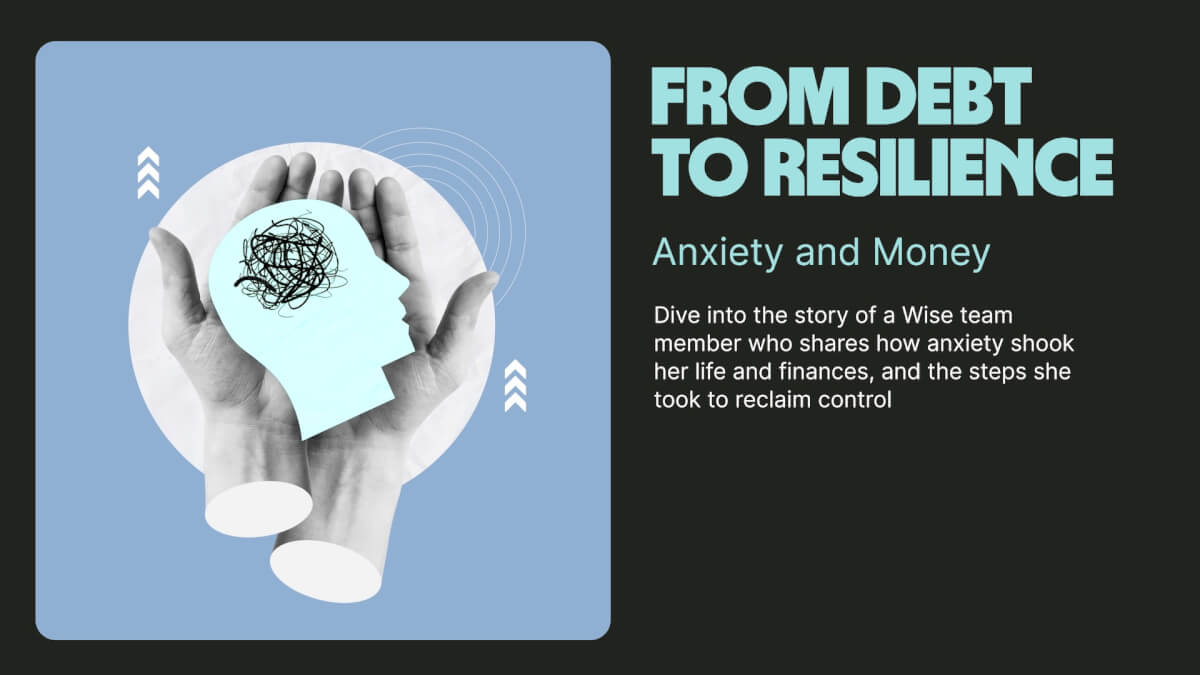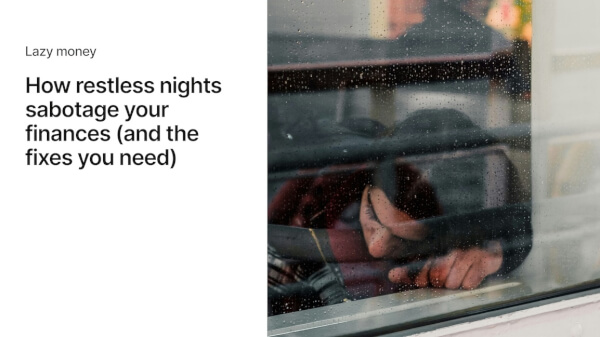Your Christmas Dinner in numbers
Tis the season to eat a lot of yummy food, so Wise has teamed up with the food-and-culture expert and Chef, Mallika Basu as part of our Christmas Without...

It's World Mental Health Day, a topic that means the absolute world to me. Mental health doesn't get the attention and support it deserves, but things are improving. And while it's amazing there's now a day dedicated to shining the light on mental health and its impact on the lives of so many people - those who have to be "aware" of it every day of the year.
Mental health, in all its forms, has had a significant impact on my life. It's affected my relationship with the world, myself, other people, and, of course, money.
I'm "neurodiverse" and have pretty severe ADHD. That means that my brain processes things and functions differently to what I guess we call "a neurotypical person," aka a "neurotypical person." And, while I now love the way my brain works, the anxiety and depression that came along with it ran my life for quite some time. That is until I got diagnosed and started connecting and sharing with others in similar situations. Gone with the shame in came the acceptance, and now I see what I have as a huge plus and have taken steps to become a total finance queen-ish 👑.
The power's in the sharing. With the help of two of my colleagues, who've been trusting enough to share their stories with me, I've written a mini-series on how mental health plays a part in our lives and finances.
What touched me the most when speaking to them was that it's so easy to look at a person and assume everything's ok, and their lives are peachy and then feel even more alone in what you're going through. But the fact is, good mental health or not, everyone has something going on. And yes, opening up can be terrifying because we're not always taught to be vulnerable or see our feelings and honesty as bravery. But it is a brave thing to do.
And with that, here's my colleague's story. I hope I'll do it justice, and I hope you get something from it ❤️
First things first, we need to talk about how mental health and our wallets intersect.
Here are a few UK insights from The Money and Mental Health Policy Institute and the charity Mind:
There’s undoubtedly more to be said on this, but now…
It all took me by surprise. I guess I felt like I was ok. I don't remember having any symptoms, I didn't suffer from anxiety, and I wasn't depressed at all. Everything started when I moved abroad. Leaving the familiarity of home and fleeing the nest hit me harder than I thought it would. I moved abroad when I was 23, and deciding to open my world up to something new was such an exciting thing to do. But I don't think people talk about the difficulties that can come with it, especially not when you're struggling.
I just didn't know what was going on. A dark cloud hung over me all of the time, and my anxiety could get so bad it could suck everything out of me. I was so used to being in control. Things that used to feel easy felt hard. Really hard.
I know mental health is on people's radar now, but that wasn't the case growing up. My generation didn't talk about it. There was no opening up. It was a "get on with it" mentality, and it sort of felt like struggling with mental health was abnormal. Oh, and medication? Not even an option. So, I stayed quiet, which meant I stayed in the dark place I was in. I didn't grow up getting help I probably needed sooner. Not just probably, definitely.
And because what I was feeling felt so taboo, when I did eventually try to open up to friends or family, looking for support or someone to say, "I get it," I'd leave feeling worse. The people in my life couldn't relate, or maybe they struggled with mental health issues too but didn't feel like they could say anything. Whichever one it was, I left those conversations feeling even more alone, and honestly, I felt ashamed, like there must be something seriously wrong with me.
My friends and family love me, so their responses were never harsh or dismissive. But when you speak to people who don't get it, the "advice" they offer and how they make it all sound so simple doesn't help because it wasn't simple. Not for me.
Back home, I was so on top of my finances. I literally had an immense, colour-coded spreadsheet where I input all of my incoming and outgoing money. The sheet even had formulas and everything so I could calculate my monthly budget.
So, a huge reason it took me by surprise wasn't just the anxiety and depression I was suddenly feeling and couldn't explain, but the financial toll it took on me. Independence has always been really important to me, and I started working when I was 16. But I began to struggle with money, and moving cost me way more than I expected. I didn't have the stable income I was used to having, I didn't have the comforts and familiarity of home, and my money struggles began to wear me down.
The isolation made everything worse. And when I get anxious or depressed, all I wanted to do was numb that pain as quickly as possible. I can’t describe how scary it feels when I go into panic mode. So, I started to develop unhealthy coping mechanisms. My first response was to turn to food, and then I turned to shopping, too.
The days of having the most efficient and organised spreadsheet of all time ended, and mindful spending flew out the window. But my rationale was, “I feel awful, so I should treat myself to something because it’ll make me feel better.” Clothes were my go-to. I thought dealing with the outside would help the inside.
And it would make me feel better for a second. In hindsight, at the beginning, it actually made me feel better for more than a second. Until it didn’t. What I essentially considered to be self-care turned out to make me feel intense shame every time I pressed “buy.” When you’re in it, you keep going and going. It felt like an addiction.
On the topic of overspending, I have one word to say: hormones. I have anxiety and depression, and when hormones get added into the mix, my God, does it amplify my mental health. As a woman, sometimes you’re forced to accept that for a chunk of every month, you’re going to feel awful. My hormones were so bad I needed medication to ease the depression, and whenever they were sky-high, my shopping would inevitably be on another level, too.
My financial situation was at a rock bottom, and because I was so low, I didn’t have it in me to return the clothes I didn’t want: more spending, more shame, more anxiety, more depression, less money.
That’s when I got into debt. Not massive amounts of debt, but enough for it to be a problem. So, with the addiction came the avoidance. I wouldn’t look at my bank account for days at a time, sometimes longer. I totally avoided paying bills and never made them on time. I didn’t want to and couldn’t deal with anything.
Truthfully, I thought I was lazy, but then I started therapy and realised I wasn’t lazy. What I was going through wasn’t abnormal, and I wasn’t alone. Speaking to my therapist was the first time I genuinely opened up, and this conversation we’re having right now is the first time I’ve genuinely opened up outside of my space with her.
On a personal note, speaking to someone has made a massive difference, and I’m learning to show myself compassion and cope in healthier ways. That being said, I’m still on a journey.
My not-so-healthy coping mechanisms still flare up. But now I’m aware of them, and I understand my mind, so I can do something about it when it happens and not beat myself up when it does. That’s important.
Thankfully, I managed to get out of debt with the help of a financial advisor. And I:
Like I said, I’m still new to this journey, but that’s where I’m at now.
Mental health charity, Mind
NHS covered mental health services in the UK
Support search tool, Hub of Hope
Podcast: The Anxiety Slayer
Podcast: Ten Percent Happier with Dan Harris
Book: Untethered Soul: The Journey Beyond Yourself
Link: Self-care for anxiety
PS. while sharing our struggles and journies is incredibly helpful, Wise isn't an authority on Mental Health.
*Please see terms of use and product availability for your region or visit Wise fees and pricing for the most up to date pricing and fee information.
This publication is provided for general information purposes and does not constitute legal, tax or other professional advice from Wise Payments Limited or its subsidiaries and its affiliates, and it is not intended as a substitute for obtaining advice from a financial advisor or any other professional.
We make no representations, warranties or guarantees, whether expressed or implied, that the content in the publication is accurate, complete or up to date.

Tis the season to eat a lot of yummy food, so Wise has teamed up with the food-and-culture expert and Chef, Mallika Basu as part of our Christmas Without...

Millions of people around the world travel over Christmas, Hanukkah and Kwanzaa. In 2022 alone, 77,000 flights took off on Christmas Day globally. That may...

Salt-N-Pepa the iconic hip hop group = ❤️ love Salt and pepper, AKA the only seasoning I used as a university student = 🥲sigh Taking the Spice Girls advice...

The festive season is upon us, and it’s pretty much the same deal every year: Shop for gifts last minute Eat like a Sumo wrestler in training Travel to see...

We've teamed up with personal finance expert, Kia Commodore to help give your money a kick up the backside so you can go ahead and sleep. “Lazy Money” is what...

We've teamed up with personal finance expert, Kia Commodore to help give your money a kick up the backside so you can go ahead and sleep. “Lazy Money”...